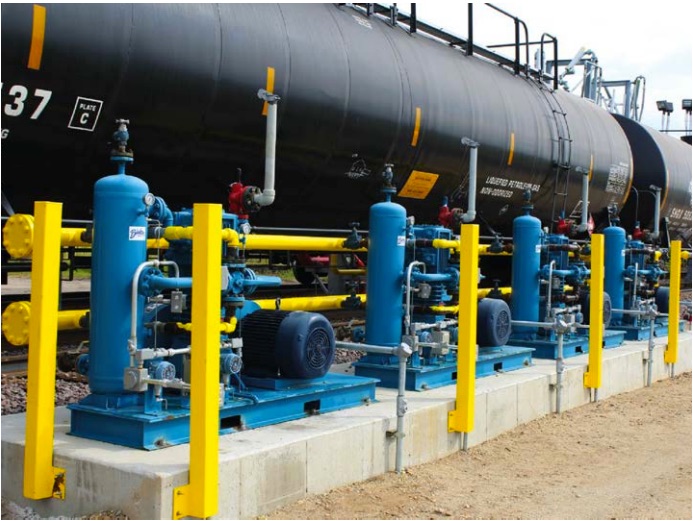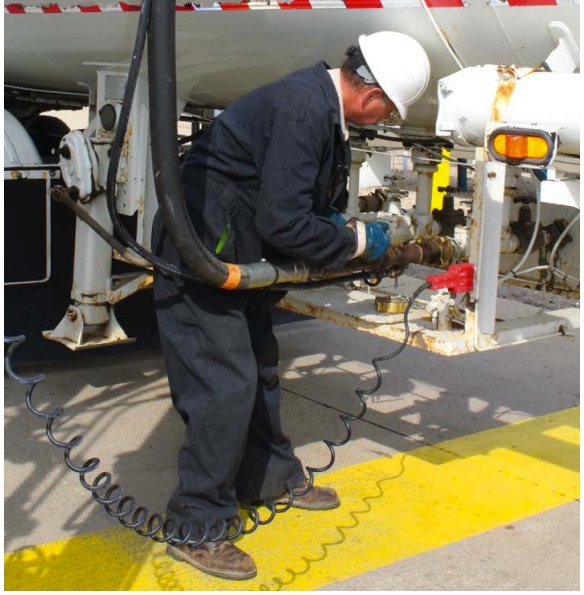PROPANE • THE CHANGING ENERGY PICTURE IN NORTH AMERICA IS PLACING NEW DEMANDS ON THE LPG SUPPLY CHAIN AND ITS EQUIPMENT, REPORTS BILL HOLMES*
A NEW ERA in Minnesota's propane supply system dawned in May 2012, when Kinder Morgan Energy Partners announced the launch of its Cochin Reversal Project.
The aim of the project was to reverse the flow of the Cochin Pipeline, which at the time was responsible for supplying 38 per cent of Minnesota's propane.
The Cochin Pipeline was put in service in 1978 to carry propane from Alberta to Ontario, stopping off along the way to supply the northern US states. Kinder Morgan, responding to the changing energy picture in North America, wanted to use the line instead to take diluents — light condensates, pentanes and other C5s — from Kankakee County, Illinois to the oilsands region of Alberta.
Minnesota uses up to 500m gallons (1.9m m3) of propane a year, about half for home heating and 40 per cent for agricultural applications. "When they shut down the Cochin pipeline, it was imperative to find new ways to get propane into the state to keep up with demand," says Scott McClelland, an engineer at LPG & NH3 Supply, Inc of Buffalo, Minnesota, a supplier of equipment and services for the local propane market.

"Now that the Cochin has ceased the shipment of propane from Canada into the US, our industry has a large void in distribution," agreed Jason Doyle, founder and president
of Alliance Energy Services, in a July 2014 interview in Butane-Propane News. "Supplying the market during peak demand periods will be very challenging. The industry must work together; more than ever, to plan and adjust to these distribution challenges."
PIPELINE ON RAILS
Seeing the opportunity to fill the propane supply niche in the state, Alliance purchased Kinder Morgan's propane terminal in Benson, Minnesota. The terminal was served by the Cochin terminal and is located some 120 miles west of Minneapolis near 1-94. This was the first major deal for Alliance Midstream, a subsidiary of Alliance Energy set up to own, operate, acquire and develop midstream assets used in the transport and storage of energy products.
Most of the infrastructure at the Benson terminal was in place, including 17 propane storage tanks with a total storage capacity of 1.53m gallons (5,800 m3). "The terminal in Benson has a lot of storage capacity but we needed a way to get product into the facility," says Chad Cain, dealer account manager with Alliance Midstream, who helped oversee the build-out of the facility. "Alliance Energy decided the best way to do that was by rail, so we installed the railroad spur off the BNSF mainline."
As the rail spur was being built, Alliance contracted with LPG & NH3 Supply to construct and outfit a propane rack and unloading system that could unload up to 16 railcars at a time; with the average LPG railcar having a capacity of 33,000 gallons, this would be as much as 530,000 gallons of product flowing into the facility's storage tanks at once. The propane was to be sourced mainly from Canadian suppliers with smaller volumes acquired from the growing production areas in neighbouring North Dakota.
"They worked with us to design a system that could unload 16 railcars at a time and get the propane into storage," recalls McClelland. "What they've got now is a large monolithic structure, one long continuous platform with eight unloading stations on each side. What's unique about the setup is that this was an existing pipeline asset that has started filling from rail after they built a rail spur, switch and platform for unloading."
PRESSED INTO SERVICE
A vital element in the unloading system was the choice of compressor. McClelland recommended LB942 Series reciprocating gas compressors from Blackmer. "We've got four LB942 compressors total, which are each good for unloading two railcars at a time," he says. "What they're doing is hooking up the railcars, using the LB942s to unload the liquid and perform vapour recovery. The terminal runs all the time and with those compressors they can turn their 1.5m gallons of storage, fill it and pump it out, all in 24 hours. They can offload 16 cars in only six or seven hours."
"Our Blackmer compressors have to be operating in all weather conditions at all times and be failsafe with no problems because if we're shut down we've got a line of trucks that are waiting and that just can't happen," says Johnson. “I'm very pleased with the product — they're very quiet, they run amazingly, we haven't had any problems. You push the button and it's going to work all day, no problem."
The LB942 compressors, which feature 30-horsepower motors and the LW mounting configuration, including pressure gauges, a structural steel base and welded or flanged piping, are ideal for the Alliance terminal's needs because they provide single-stage, oil-free operation and have been designed specifically for propane transfer and vapour recovery with a maximum flow rate of 125 scfm [212 m3/hr].

Design features of the LB942 compressors include high-efficiency valves, ductile-iron pistons, self-adjusting piston rod seals, head and cylinders sealed with O-rings, heavy-duty crankshaft, pressure-lubricated bearing, pressure-assisted piston rings and wear- resistant crosshead assemblies. They also feature ASME liquid traps, which have a mechanical float to protect the compressor by preventing liquid from entering.
“This is the largest propane facility in three states, so everything needs to be state-of-the-art," says Johnson. “To operate at the level that we are going to operate at, we need top-of-the-line equipment and they spared no expense when they bought those Blackmer compressors. There's no way they're going to let us down. They're like the Energizer Bunny, and I would recommend them to anyone."
With the Blackmer compressors playing a prominent role, the operation has been so successful already that Alliance has purchased some land around the 17-acre facility with an eye toward eventually adding more track to handle more railcars and building additional storage tanks. Any unloading rack or storage additions would also conceivably increase the need for additional Blackmer compressors.
Bill Holmes is North American sales director of PSG's Energy & Transfer Group. PSG, a Dover company, owns a number of pump brands, including Blackmer, Griswold, Mouvex and Wilden. More details can be found at www.blackmer.com or www.psgdover.com.